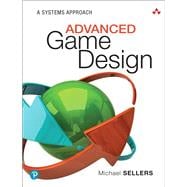In Advanced Game Design, pioneering game designer and instructor Michael Sellers situates game design practices in a strong theoretical framework of systems thinking, enabling designers to think more deeply and clearly about their work, so they can produce better, more engaging games for any device or platform. Sellers offers a deep unifying framework in which practical game design best practices and proven systems thinking theory reinforce each other, helping game designers understand what they are trying to accomplish and the best ways to achieve it. Drawing on 20+ years of experience designing games, launching game studios, and teaching game design, Sellers explains:
- What games are, and how systems thinking can help you think about them more clearly
- How to systematically promote engagement, interactivity, and fun
- What you can learn from MDA and other game design frameworks
- How to create gameplay and core loops
- How to design the entire player experience, and how to build game mechanics that work together to create that experience
- How to capture your game’s “big idea” and Unique Selling Proposition
- How to establish high-level and background design and translate it into detailed design
- How to build, playtest, and iterate early prototypes
- How to build your game design career in a field that keeps changing at breakneck speed








